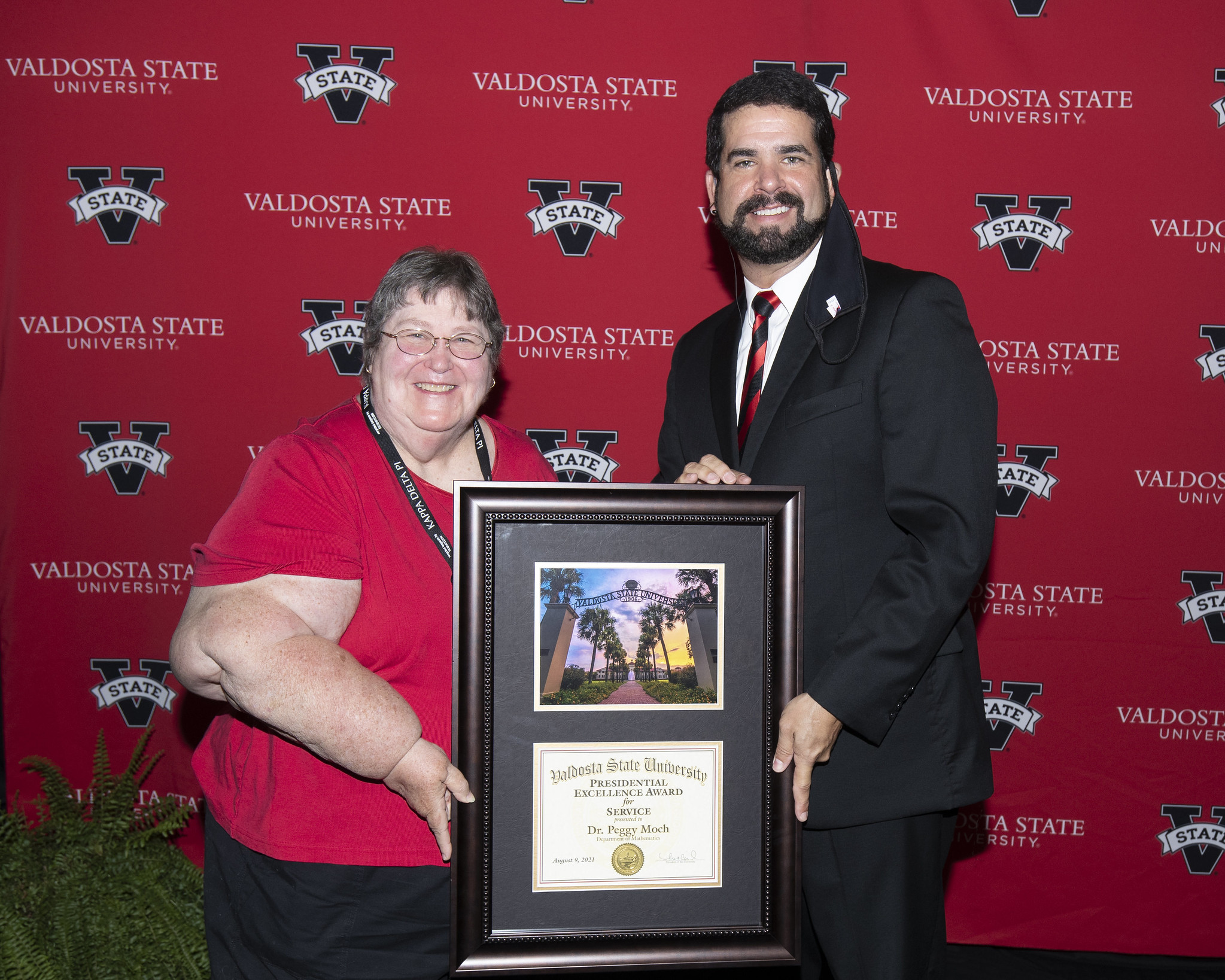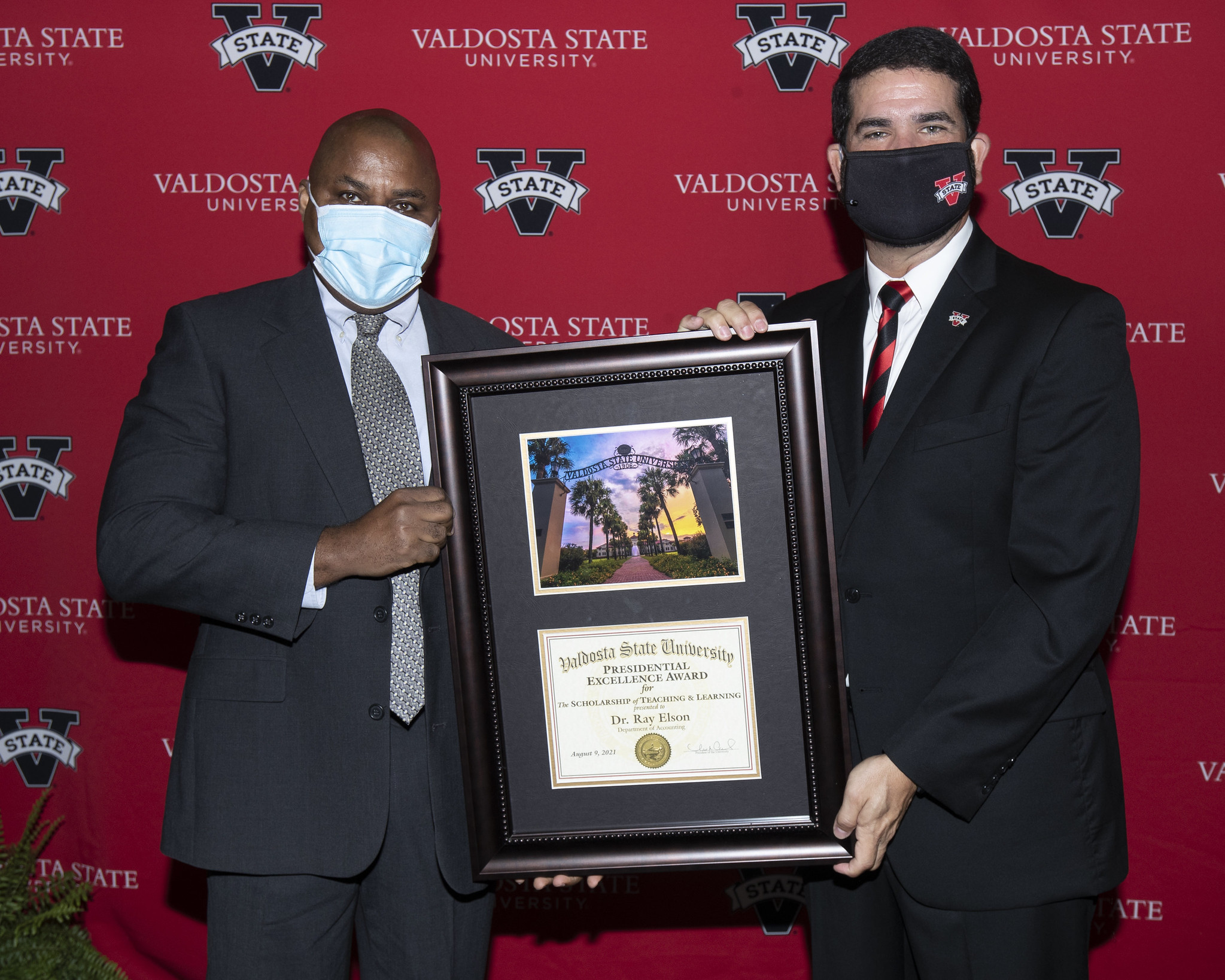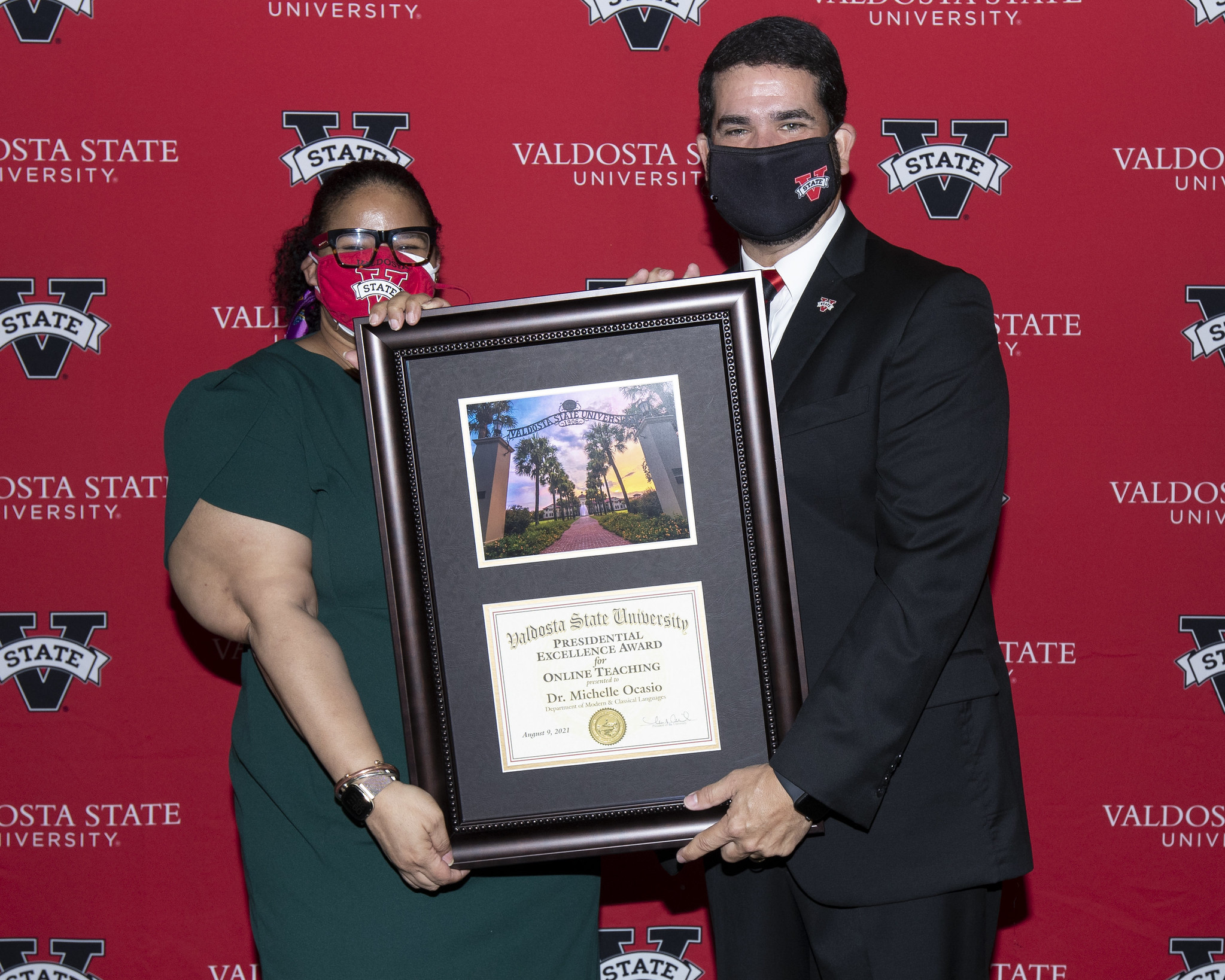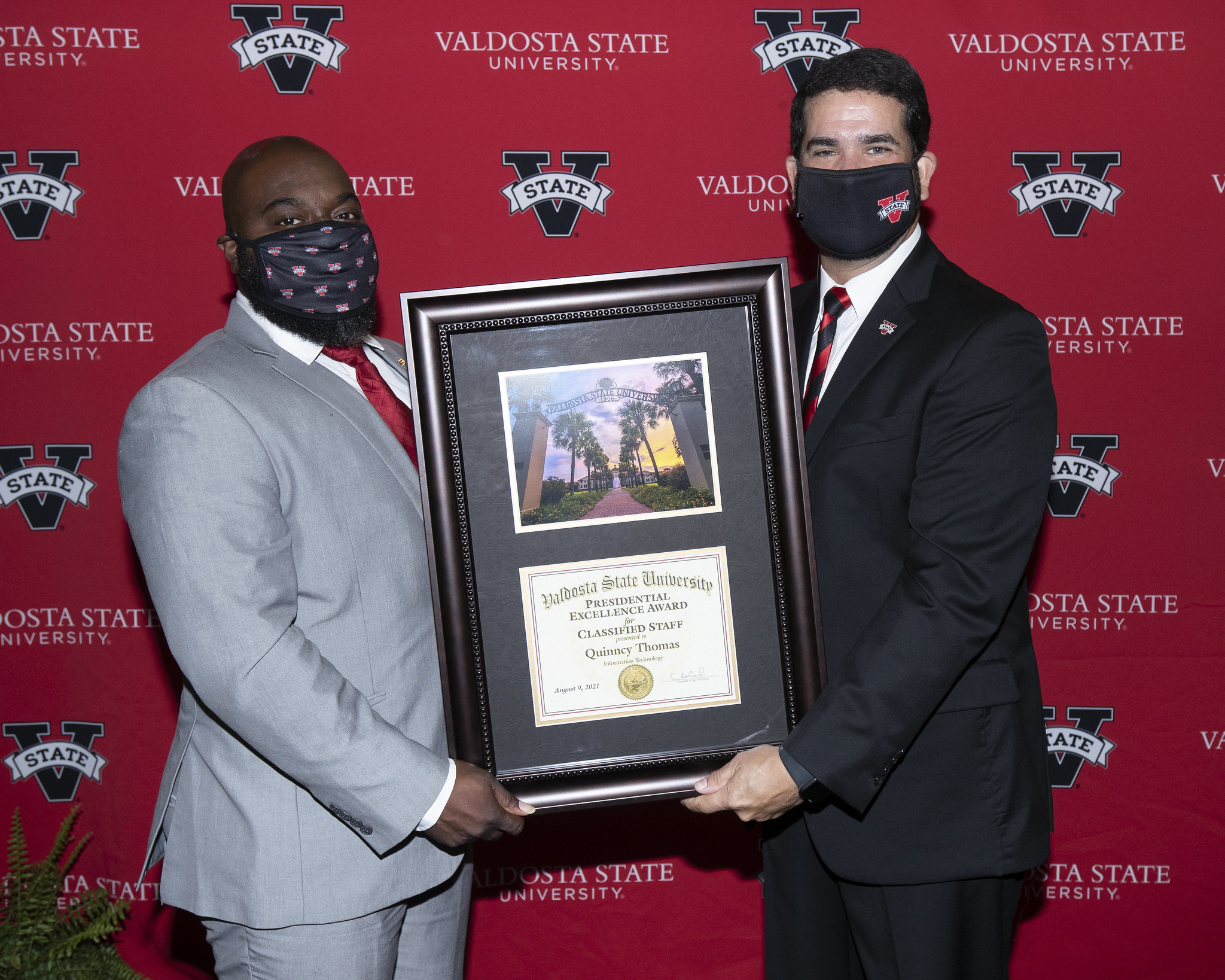October 26, 2021
21-93
Jessica Pope
Communications and Media Relations Coordinator
VSU’s 2021 Excellence Awards Honor Distinguished Faculty, Staff

|
|
Dr. Pat Miller, Presidential Excellence Award for Teaching
|
VALDOSTA — Dr. Richard A. Carvajal, president of Valdosta State University, recently honored five faculty members and two staff members with a 2021 Presidential Excellence Award.
The Presidential Excellence Award for faculty is an annual tradition at VSU, one that recognizes the diverse talents and contributions of the university’s innovative and active faculty. Awards are given for excellence in teaching, research, service, online teaching, and scholarship of teaching and learning.
Dr. Pat Miller, Presidential Excellence Award for Teaching
The Presidential Excellence Award for Teaching recognizes a faculty member who employs innovative teaching strategies and demonstrates a strong commitment to student success.
Dr. Pat Miller joined the VSU faculty in 1989 and currently serves as a professor of English. When asked what courses she most looks forward to every year, she replied, JOUR 3540: Law and Journalism because it allows her “to help students understand why what they do as journalists is so important,” JOUR 3080: Editing for Publication because it allows her “to teach students to become ‘mean, lean writing machines,’” and JOUR 4520: Literary Journalism because it allows her “to teach the satisfaction of creating a story well told.”
VSU: What strategies / tools / techniques have proven most effective in increasing student learning in your classroom?
Miller: The most effective strategy I’ve introduced is moving to project-based courses that require students to present in public as experts in the subject matter. They have skin in the game then. And they use those experiences to professionalize as they build their resumes. For example, my students almost always present on some topic at the Georgia College Press Association conference. This year the topic is how to write about Title IX.
VSU: Helping students achieve success often involves countless hours of work outside the classroom. In what ways do you actively engage with your students to continue the learning process outside of scheduled class times?
Miller: I consider every contact with a student teaching time. So, engagement includes holding regularly scheduled advising times, overseeing internships, goading them to apply for scholarships, working with them on Spectator projects, and whatever else comes down the pike.
VSU: What advice do you have for other faculty who wish to identify more effective ways to stimulate engagement and comprehension in their own classroom?
Miller: I have found using Perusall, a shared reading app that allows me to explain difficult concepts and to pose questions to which students respond, extraordinarily useful in the Law and Journalism class. It allows students to engage with each other as well. I have used shared OneDrive documents for the same effect in the senior capstone course I’m currently teaching. I always use a lot of problem-solving scenarios and a tremendous number of low-stakes hands-on exercises. In short, we do a lot of things that push students beyond their comfort zones but that allow them the freedom to fail without a lot of risk.
Miller concluded by asking and answering one more question. Q: How does one win this award? A: By having great students — motivated, curious, willing to work. Good teaching is a sort of curmudgeonly love and always an honor to do it well.
Dr. Jin Wang, Presidential Excellence Award for Research
The Presidential Excellence Award for Research recognizes a faculty member with a strong record of creative scholarship.
Dr. Jin Wang joined the VSU faculty in 1994 and currently serves as a professor of mathematics.
Wang enjoys teaching classes in operations research, senior seminar in data science, and statistical computing and conducting research in the areas of data science, machine learning, big data, operations management, and optimization.
VSU: Why do you believe it is important for faculty to conduct research and contribute new knowledge to their fields?
Wang: Faculty research is important because it improves the quality of teaching. I firmly believe that research and teaching are interdependent and share the same goals. Teaching can generate interesting and good research topics, and research often provides new explanations and teaching methods. Faculty members who perform research typically stay at the forefront of their fields and are then able to share their disciplines’ latest developments with their students. Additionally, students benefit tremendously from getting directly involved in research. I’ve seen this through publishing 21 peer-reviewed papers and delivering 23 conference talks with undergraduate students in addition to the more than 50 undergraduate research projects I have directed.
Beyond teaching, faculty research is also necessary and valuable in our daily lives at the university. For example, I have conducted a very successful research project for VSU — “Data Mining: Predictive Models for Student Success” — that has helped in higher education management. I investigated the relationship between the VSU retention rate and the predictors through the VSU student database. The project discovered important predictors that then were used by VSU to make strategic changes that ultimately improved the 2021 VSU retention rate by 9 percent.
VSU: How many publications, presentations, and other scholarship have you completed? What drives you to find time outside of teaching, mentoring, and serving the university to conduct this research?
Wang: I have completed more than 110 publications, presentations, and seminar talks, including five invited conference keynote addresses. Currently I am serving as the editor-in-chief of an international journal. I have served four times for the general conference chairs and two times for the conference program chairs. I think there are still some theoretically important and practically related questions in the field that have not yet been fully resolved, so my passion for research stems from my enthusiasm for research topics and the knowledge that my work has an impact on the real world.
VSU: What advice do you have for other faculty who wish to get more involved in research?
Wang: Attend as many research conferences as possible. Meet others in your field and learn about the latest research. Listening to and participating in lively discussions at the conference can provide you with new research ideas and help refine your existing concepts.
Dr. Peggy Moch, Presidential Excellence Award for Service
The Presidential Excellence Award for Service recognizes a faculty member who has demonstrated a strong and consistent commitment to service at VSU and to the community.
Dr. Peggy Moch joined the VSU faculty in 2002 and currently serves as a professor of mathematics. She said her favorite classes to teach “are the ones where the students work hard and realize they can do math.” Her primary research interests are in teacher and student self-efficacy as it pertains to mathematics, which also includes motivational theories related to mathematics, math phobias, and math anxiety.
VSU: Teaching, mentoring, and conducting research are already full-time jobs. What motivates you to make time for service?
Moch: I believe one person can make a difference. I further believe a group of committed individuals creates a synergistic environment where the sum of the parts is greater than the whole. These beliefs naturally lend to my involvement with serving on a variety of committees with a variety of responsibilities ranging from observer to committee chair to international president of an honor society in education. I like being part of the solution and knowing that I did my part to make things better or to maintain the status quo. I am not just a member of a given committee, but I serve on that committee, I do my part and participate with enthusiasm. Serving on a committee means actively fulfilling the roles, assignments, and obligations the committee requires. Sometimes this means serving before or continuing to serve after a formal assignment has been given. Service sometimes means doing the right thing and continuing on in a behind-the-scenes capacity or as a non-voting ex officio member until others feel confident and prepared to do the work.
VSU: Estimate how many service roles you have served in during your time at VSU. Which ones have allowed you to have the biggest impact, and which service roles you are currently serving in this semester?
Moch: I have participated on well over 150 service roles during my time here at VSU. I think the service roles I have performed that have had the biggest impact were as the leader of the Faculty Senate, working on the COSA Bylaws Revision Committee, working on the College of Nursing and Health Sciences Promotion and Tenure Policy Revision Committee, installing the chapter and being the faculty sponsor for the Alpha Beta Kappa student chapter of Kappa Delta Pi International Honor Society in Education, helping to establish the IDEA Center, which is now CELT, and being the co-principal investigator of the Louis Stokes Alliance for Minority Participation National Science Foundation Grant for the Southwest Georgia STEM Pathways Alliance.
This semester in the Department of Mathematics I am chairing the Library Committee and the Mathematics Education Program Committee, and I am a member of the Promotion and Tenure Committee and a member of the Awards Committee. At the university level I am the chapter counselor and faculty sponsor for the Alpha Beta Kappa student chapter of Kappa Delta Pi International Honor Society in Education, I am the American Association of University Professors chapter president, I am the chair of a dissertation committee, I am the co-chair of the University Assessment Committee, and I am the co-principal investigator, campus coordinator, and activity coordinator for the Louis Stokes Alliance for Minority Participation National Science Foundation Grant for the Southwest Georgia STEM Pathways Alliance. On an international level, I also continue to serve as a member of the Kappa Delta Pi Past Presidents Committee.
VSU: What advice do you have for other faculty who want to make time for service?
Moch: We all have time to do the things we want to do and believe are important. So if you wish to serve, choose to serve somewhere you believe you can make a difference. Choose to serve and be actively engaged. Be a part of the solution. There are many, many service activities available here at VSU as well as within the professional organizations you belong and the Valdosta community at large. As one of the lead characters in the “Robots” animated movie would say, “See a need, fill a need!” It will not always be easy or convenient, but I believe it will be worth it.
Dr. Raymond Elson, Presidential Excellence Award for Scholarship of Teaching and Learning
The Presidential Excellence Award for Scholarship of Teaching and Learning recognizes a faculty member who produces innovative scholarly work on the science of teaching and learning and regularly contributes new questions and knowledge on the subject.
Dr. Raymond Elson joined the VSU faculty in 2003 and currently serves as interim associate dean of the Harley Langdale Jr. College of Business Administration and a professor of accounting. His enjoys teaching graduate and undergraduate auditing, as well as government and nonprofit accounting classes, and researching internal control and corporate governance-related topics.
VSU: Why do you believe it is important for teachers to do the work necessary to keep their class content interesting and relevant to new generations of students?
Elson: Change is constant, and so our course material needs to be refreshed to show those changes. Also, the learning style of each new generation of students changes, and so, as teachers, we must evolve our teaching approach to engage these students. One approach I use is to ask students to complete the VARK questionnaire prior to the start of the semester. I share the composite results with the students and try to focus class content to each group of learners. I also encourage the students to use their VARK results to engage with the course material.
VSU: What strategies / tools / techniques have proven most effective in increasing student learning in your classroom?
Elson: Since accounting is a practical subject, I try to provide practice sets in all of my classes. This approach is rather time consuming and is not appreciated by students, at least not in the short term. I simply believe that one of the best strategies is to learn by doing. Overall, I try to bring techniques I learned at the Master Teacher Program offered by Georgia State University and during my two years with the University System of Georgia Chancellor’s Learning Scholars Program into the classroom
VSU: What drives your research / scholarly work in the field of teaching and learning?
Elson: The simple answer is curiosity. I like to examine topics that are interesting and can be used in the classroom. I also look for opportunities to engage with my graduate students and colleagues. One of my favorite projects was developed with colleagues from information gathered during a company visit in China approximately 10 years ago. We created a case study focusing on risk assessment, which was published in an academic journal. I continue to use this case study in my graduate auditing course to help students understand the risk assessment in the audit process.
VSU: What advice do you have for other faculty who wish to identify more effective ways to stimulate engagement and comprehension in their own classroom?
Elson: Think of the classroom as your lab. It’s a place to try new ideas. Look for pedagogy that is appropriate for your subject area and try them. It’s important though to realize that some ideas will fail, but it is still worth the risk.
Dr. Michelle Ocasio, Presidential Excellence Award for Online Teaching
The Presidential Excellence Award for Online Teaching recognizes a faculty member who demonstrates a strong commitment to quality online teaching and learning, employs innovative online teaching practices, and develops rapport with individual learners in and beyond the virtual classroom.
Dr. Michelle Ocasio joined the VSU faculty in 2011 and currently serves as an associate professor of Spanish and teaching English to speakers of other languages. Her favorite class to teach is ESOL 4010/ESOL 6010: Applied Linguistics for TESOL Teachers.
“My first love is linguistics, and I enjoy reading about different areas of research in the area, such as the fascinating field of forensic linguistics, on my own time,” she shared. “For most students, this class is their first exposure to the field, and I’m eager to share and pass on my enthusiasm.”
Her favorite topic to research is contact and historical linguistics, specifically for the Garifuna language.
“I have recently been invited by the European Research Council, hosted by the University of Helsinki, Finland, to contribute information about the creation of the Garifuna language to their GramAdapt project. It’s a project that has identified 50 language contact scenarios from around the world to find out how linguistic structures adapt to the sociolinguistic environments in which they are used.
VSU: What strategies / tools / techniques have proven most effective in increasing student learning in your online classroom?
Ocasio: There are a few strategies about which students have commented that really help them learn. I have created short — less than 10 minutes — weekly videos that introduce hard-to-understand concepts for an upcoming chapter, sometimes with a review of a homework question that may be particularly difficult. I go over the concept(s) slowly and deliberately, the way I wish it had been explained to me the first time I learned it. Second, I provide many opportunities for extra points through extra credit quizzes. These quizzes, which are invisible in BlazeVIEW (or GoVIEW) to all students, are only available upon request. Mentions of the quizzes are hidden in plain sight throughout the course, such as at the end of a video or embedded in chapter/module instructions. The quizzes are always based on class material, so although they are earning extra points, they are also gaining deeper insight to what is being taught. Finally, one of the more powerful techniques for increasing student learning is efficient encouragement and feedback. When a student’s response to a discussion or quiz is particularly intriguing, I might stop at that moment and send the student an email to remark about how impressed I was. There is a space for feedback within the quiz or discussion grading, but most of the time I’m uncertain if a student returns to a graded assignment to view feedback. Sometimes an email like this will spark a series of back-and-forth responses that last the entire semester — and sometimes beyond.
VSU: When it comes to developing a meaningful rapport with your online students, how do you ensure that your students feel actively engaged in and satisfied with their online learning experience?
Ocasio: I think the worst part about learning online is a feeling of being “out there” alone, and it can be especially frustrating when you’re reading course material that you don’t understand. My husband took an online course once where the instructor didn’t answer for days, and when they did, the response was not complete. The experience helped me better empathize with the other side of online learning. I try to answer all questions within 30 minutes of receiving them, and if I need more time, then I answer to let them know that I will respond soon. My responses are sometimes lengthy, but I want to be sure to explain fully with many examples and an invitation to write back if anything at all is still unclear. Also, I try to spot when a student doesn’t turn in assignments for weeks in a row, so I can give them a chance to either catch up or let me know what’s going on. Finally, I occasionally contact students who, although they are turning in assignments, haven’t emailed to ask any questions at all. This is just to check in and ask how the course is progressing for them. It sounds like a lot of work, but in the end, I believe it does save time because it’s much more stressful and time-consuming to answer a long list of emails about assignments, making up work, or other end-of-semester duties when the course is going to end in a couple of weeks.
VSU: What advice do you have for other faculty who wish to identify more effective ways to stimulate engagement and comprehension in their own online classroom?
Ocasio: One way to stimulate engagement and comprehension is to learn at least one bit of new tech to add to the online course that also has a mobile phone app, such as VoiceThread or something more exciting and engaging, by visiting Dr. Bobbie Ticknor in the Virtual Reality Lab. One can learn VoiceThread, for example, as well as other tech, through eLearning. Just yesterday I was invited to a meeting that uses www.gather.town, which seems very interesting. You must be cautious, though, because some students are nervous and/or timid with extra tech, especially when they must go to a different website or if it requires a software download, anything that takes time and effort away from learning the actual course content. It’s helpful if you find one, like VoiceThread, that can be integrated right into BlazeVIEW. It may take some time to learn, but once you have it set up just the way you want — and it may take a few semesters to work out the tiny glitches — the course will run smooth as glass and the students will appreciate something novel.
***
The Presidential Excellence Award for staff is also an annual tradition at VSU, one that recognizes the high standards of service, initiative, reliability, professional attitude, exemplary job performance, and leadership of the university’s dedicated staff.
Quinncy Thomas, Presidential Excellence Award: Classified Staff
Quinncy Thomas joined the VSU staff in 2014 and currently serves as a technical response unit coordinator for Information Technology and a member of the Executive Event Team. He works with the IT Help Desk and provides digital signage, faculty and staff, residence hall, specialty lab, and event technology support.
VSU: What advice do you have for VSU’s fall graduates and young alumni who wish to demonstrate excellence in their current / future professional roles?
Thomas: Never stop believing in yourself, because your belief in you will push you to the heights you want to achieve.
Nicole Foster Presidential Excellence Award: Classified Staff
Nicole Foster joined the VSU staff in 2006 and currently serves as manager of the Student Health Center and a member of the COVID-19 Task Force and the Mental Health Task Force.
VSU: What advice do you have for VSU’s fall graduates and young alumni who wish to demonstrate excellence in their current / future professional roles?
Foster: Class of 2021, you all should feel so proud of your accomplishments and perseverance in the most uncertain times. Despite these challenges, you are stronger. Let your experiences teach, guide, and inspire your future path. All your hard work and perseverance have led you to this proud moment in your lives. Never stop dreaming, and continue striving for the best.
On the Web:
https://www.valdosta.edu/academics/academic-affairs/presidential-excellence-awards.php
https://www.valdosta.edu/administration/council-on-staff-affairs/staff-excellence-awards.php
Newsroom
- Office of Communications Powell Hall West, Suite 1120
-
Mailing Address
1500 N. Patterson St.
Valdosta, GA 31698 - General VSU Information
- Phone: 229.333.5800
- Office of Communications
- Phone: 229.333.2163
- Phone: 229.333.5983
 Dr. Jin Wang, Presidential Excellence Award for Research
Dr. Jin Wang, Presidential Excellence Award for Research Dr. Peggy Moch, Presidential Excellence Award for Service
Dr. Peggy Moch, Presidential Excellence Award for Service Dr. Raymond Elson, Presidential Excellence Award for Scholarship of Teaching and Learning
Dr. Raymond Elson, Presidential Excellence Award for Scholarship of Teaching and Learning Dr. Michelle Ocasio, Presidential Excellence Award for Online Teaching
Dr. Michelle Ocasio, Presidential Excellence Award for Online Teaching Quinncy Thomas, Presidential Excellence Award: Classified Staff
Quinncy Thomas, Presidential Excellence Award: Classified Staff Nicole Foster Presidential Excellence Award: Classified Staff
Nicole Foster Presidential Excellence Award: Classified Staff